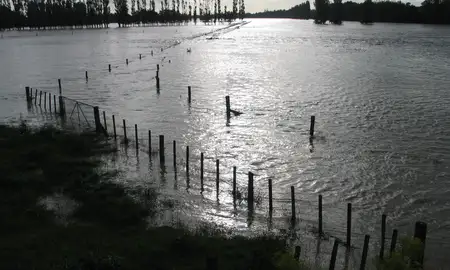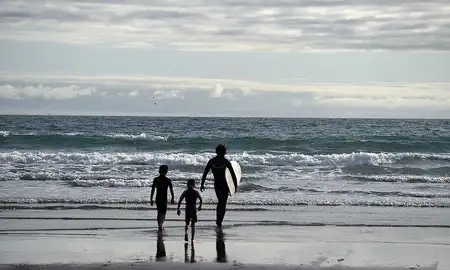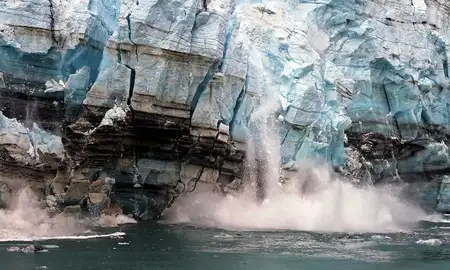
Professor Bruce Glavovic.
Cyclone Gabrielle has left a path of tragedy and devastation. Like all New Zealanders, my heart goes out to all who have had their lives turned upside down by Gabrielle. The outpouring of support is fantastic. But there is a long, hard recovery road ahead.
We have learned much from recent disasters and recovery efforts. Heeding these lessons is crucial. Much can be done to enable a good, enduring recovery. But it is easy to unintentionally entrench the very conditions that predisposed communities to disaster in the first place.
We face a turbulent future with climate change compounding the risk of inundation and flooding.
Land-use planning is key to future-proofing our communities.
Back in the early 2000s, the Earthquake Commission (EQC) had the foresight to recognise the vital role that land-use planning plays in reducing disaster risk and building resilience. They established position in natural hazards planning at Massey that resulted in a new generation of hazard-literate planners. EQC investment contributed to better understanding how to reduce natural hazard risk and build community resilience.
Over a decade ago, colleagues and I identified the following ‘burning issues’:
(a) Improve understanding about the nature of hazards;
(b) Prioritise risk avoidance (reduction) measures;
(c) Provide national guidance for communities exposed to repeat events and address the relocation issue
(d) Mainstream climate change adaptation.
Have the ‘burning issues’ of the 2020s changed?
The question of managed retreat loom even larger as climate-compounded risks become our present reality. Clear and consistent direction from Government is long overdue.
Ducking the managed retreat issue in the aftermath of Cyclone Gabrielle could mean that people rebuild in areas prone to future flooding - with inevitable disastrous consequences.
To make matters worse, tens of thousands of people and critical infrastructure are located along low-lying shorelines that will experience inundation and even more extreme events in coming decades.
Unprecedented collaboration is necessary to prepare for managed retreat. We are in this together. How we deal with this issue will profoundly shape our collective future, at every level of society.
Managed retreat is an extremely confronting and complex issue, not least because of the deep cultural, spiritual, social and livelihood ties that we have to the places we live.
Involuntary displacement after a disaster is much more traumatising than planned relocation.
Relocation is costly. And it disrupts people’s lives in manifold ways. But we cannot avoid this issue any longer. Too many people and the things we cherish are situated in floodplains and low-lying coasts. Inundation and flood-related disasters will become even more challenging in coming decades.
Attention is now being focused on whether or not to allow rebuilding in places devastated by Gabrielle and likely to be exposed to future extreme events. But there are many obstacles to overcome to enable planned relocation. Not the least obstacle is insurance provisions that lock-in development patterns with stipulations that result in replacement of ‘like with like’.
We need to avoid ad hoc decisions that result in some people relocating and some people rebuilding in hazardous locations.
Preparing for the nationwide challenge of managed retreat in the face of sea-level rise is profoundly challenging.
We already have clear evidence about the scale of this challenge, including which areas are most exposed and vulnerable to sea-level rise impacts.
The Government has been preparing to introduce a Climate Adaptation Act.
A fundamental question that arises is how to share the cost of inevitable managed retreat in coming decades. But managed retreat is much more than a question of ‘who pays’.
It is an inter-generational challenge.
It necessitates a Te Tiriti o Waitangi-led effort.
It necessitates a whole of Aotearoa New Zealand conversation – public deliberation about how to future-proof our communities.
It necessitates a whole-of-government strategy.
It necessitates cross-party collaboration.
It necessitates unprecedented political leadership that looks beyond the next election to our shared future, across coming generations.
It necessitates unprecedented collaboration across the many professions that shape our towns and cities – from planners to engineers, architects, community development specialists, etc.
It necessitates community conversations – from around our dining room tables to board rooms, marae, and in town halls and the corridors and offices of local and central government.
Managed retreat is so much more than a technical or financial challenge.
We need to fast-track a Royal Commission of Inquiry on Managed Retreat – or some equivalent thereof. This needs to go well beyond a technical analysis of the challenge that lies ahead. It needs to be buttressed by a nationwide awareness-raising programme and facilitated public deliberation.
Managed retreat is extremely contentious. We need a mediated political and public discourse.
We need to put vulnerable people first: He tangata, he tangata, he tangata.
We need to share the cost of managed retreat from the local to national level.
We need innovative public solutions crafted by tangata whenua, homeowners, government at all levels, the insurance and banking sectors, the private sector, and all those living in harm’s way.
Managed retreat or planned relocation from the most exposed localities is arguably the challenge of our generation. Unprecedented political, Māori, business and civic leadership is required. This leadership needs to enable authentic public engagement, to develop a shared vision and purpose, to address the drivers and root causes of vulnerability and future-proof our communities.
All voices need to be heard, including tangata whenua, women, youth, minority groups, future generations, our awa, and the species who share our future.
Action needs to be taken now. But we need to keep the distant future in mind, keeping options open that foster community wellbeing and resilience.
Do not allow new development in obviously exposed localities. And hold to account those who permit dangerous development decisions, including legal liability for councils and decision-makers. Lives are at stake.
Mātauranga Māori, local knowledge and science and technical knowledge are key to building shared understanding about managed retreat.
Ultimately, managed retreat is collective responsibility. It depends on strong bonds of trust and collaboration. We all have a role to play in future-proofing our flood-prone communities.
The managed retreat challenge is now front and centre to the recovery of Gabrielle-impacted communities. And this challenge extends far beyond these communities. It is a challenge that faces all of us in Aotearoa New Zealand.
Related news
New book on Critical Disaster Studies reveals lessons to prepare for turbulent times
A new book looking at disaster experiences in Ōtautahi Christchurch in the decade since 2010 uses a Critical Disaster Studies (CDS) perspective to understand what people in and around the city have lived through in the face of disaster upon disaster.

Climate change report concludes that immediate action is needed to limit inevitable impacts
A report by the Intergovernmental Panel on Climate Change has just been released, including several key contributions from a Massey academic.

Risk of COVID eclipsing climate change action?
From Antarctic ice sheet collapse to Whanganui river floods - Professor Bruce Glavovic has explored the range of climate change impacts as a contributing writer/editor on scientific reports, international panels and research projects.
